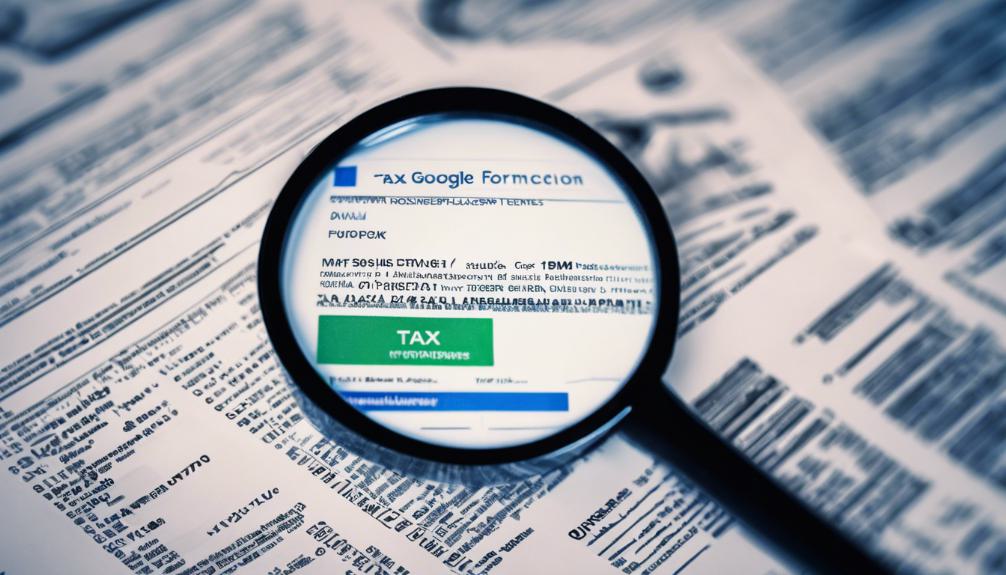Google Faces Wiretap Lawsuit Over Tax Sites
In an era where the sanctity of digital privacy is perpetually under the microscope, Google finds itself at the center of a contentious legal battle. The tech behemoth is accused of employing its Google Analytics tool to wiretap tax preparation websites, allegedly intercepting user data without consent. This class action lawsuit, invoking the Federal Wiretap Act and the California Invasion of Privacy Act, raises critical questions about the extent of privacy users can expect online. As the case unfolds, the implications for data collection practices and the responsibility of tech companies in safeguarding user information are poised to set significant legal precedents. The outcome may redefine the boundaries of digital privacy and corporate accountability, marking a pivotal moment in the ongoing debate over user data rights.
Key Takeaways
- Google is sued for allegedly wiretapping tax preparation websites, violating privacy laws.
- Accusations claim Google Analytics illegally recorded user data on tax sites.
- Users of platforms like H&R Block might be eligible for lawsuit compensation.
- The lawsuit implicates Google in knowing illegal interception of sensitive financial data.
Legal Allegations Overview

The legal allegations against Google center on a class action lawsuit accusing the tech giant of wiretapping tax preparation websites, in direct violation of both federal and state privacy laws. This serious accusation underscores increasing concerns around the privacy and security of personal information in the digital age, particularly in sensitive areas such as financial data. The lawsuit brings to light the critical need for stringent protections against unauthorized data collection and highlights the paramount importance of upholding individuals' rights to privacy. It serves a reminder to all entities involved in data handling to prioritize the confidentiality and integrity of user information, ensuring that trust and respect for personal privacy remain at the forefront of digital interactions and services.
Google Analytics Accusations

Amid rising privacy concerns, Google faces accusations that its Analytics tool unlawfully intercepted and recorded user interactions on tax preparation websites, contravening federal and state privacy laws. These allegations have alarmed individuals and organizations dedicated to safeguarding privacy rights. Google Analytics, a widely used data collection and analysis service, is at the center of this controversy. It is accused of capturing detailed information about users without their explicit consent, including sensitive financial data entered during the tax filing process. This situation underscores the urgent need for stringent data protection measures. For those committed to serving and protecting the public, it highlights the critical importance of advocating for transparency, accountability, and respect for individual privacy in the digital age.
Federal and State Violations

In light of the lawsuit, Google is accused of violating both federal and state laws by allegedly wiretapping tax preparation websites through its Analytics service. These allegations underscore a significant concern regarding the protection of sensitive financial information that individuals entrust to tax services. The Federal Wiretap Act and the California Invasion of Privacy Act, among other state laws, set stringent boundaries against unauthorized eavesdropping and data collection. These legal frameworks are designed to safeguard the privacy and confidentiality of individuals' electronic communications. For those dedicated to serving others and upholding the highest standards of privacy and respect, the accusations against Google highlight the critical importance of vigilance and adherence to legal and ethical standards in the digital age.
Data Collection Concerns

Moving from legal allegations to broader concerns, data collection practices by entities such as Google have raised significant privacy issues, especially in the context of sensitive financial transactions. The implications of these practices on user privacy are profound, touching upon the very essence of trust and confidentiality that individuals expect when handling their financial data online. As stewards of sensitive information, it is paramount for organizations to prioritize the privacy and security of their users' data. This not only guarantees compliance with legal standards but also fosters a sense of trust and reliability among users. In serving the community, it is vital to advocate for transparency and accountability in data collection practices, ensuring that users' rights to privacy are upheld and protected.
Understanding Google Analytics

How does Google Analytics function to gather detailed user data across websites, and what implications does this have for privacy? Google Analytics, a tool widely used by website owners and marketers, tracks and analyzes site traffic and user behavior. It collects data on how users interact with websites, including page views, session duration, and bounce rates. This information helps website owners understand visitor behavior, enabling them to tailor their content and services more effectively to meet user needs. However, the extensive data collection raises significant privacy concerns. Users often are unaware of the extent of information gathered about their online activities, leading to debates about the balance between valuable insights for service improvement and the right to individual privacy.
De-anonymization Capabilities

De-anonymization capabilities of Google's tracking software expose users to privacy risks by linking their web browsing history to personal identities. This process, highlighted in the findings of Stanford and Princeton research, underscores a significant concern for individuals seeking to maintain their online anonymity. By aggregating and analyzing vast amounts of data, the software not only uncovers patterns of behavior but also potentially reveals sensitive personal information. For those dedicated to serving and protecting the community, this revelation demands a proactive approach to safeguarding digital privacy. It is imperative to advocate for stringent data protection measures and educate the public about the implications of such tracking practices. This knowledge empowers individuals to make informed decisions about their online activities and privacy settings, thereby enhancing their overall digital well-being.
Targeted Advertising Mechanisms

Targeted advertising mechanisms utilize user data to create personalized ad experiences, effectively transforming anonymous online activities into opportunities for precise marketing strategies. These mechanisms are designed to serve users by delivering content that aligns with their interests and needs, thereby enhancing the overall online experience. By analyzing behaviors, preferences, and engagement, advertisers can tailor their messages to resonate deeply with their audience, fostering a sense of relevance and value. This approach not only benefits consumers by providing them with more pertinent information and options but also supports businesses in achieving higher efficiency in their marketing efforts. Through targeted advertising, the digital ecosystem becomes a more interconnected and responsive space, where the aim is to serve and satisfy the diverse preferences of the online community.
Tax Software Data Sharing

Building upon the discourse of targeted advertising mechanisms, the sharing of data by tax software raises significant privacy and legal concerns. The practices of major tax preparation services, as implicated in recent Senate reports, highlight an unsettling trend where taxpayer data is not solely processed for the purpose of filing taxes but also shared with third parties like Google. This sharing mechanism, ostensibly for refining user experience and targeted advertising, encroaches upon the sanctity of personal financial information. Professionals serving in the legal, financial, and privacy advocacy fields underscore the necessity of stringent regulations to guard against unauthorized data dissemination. The integrity of taxpayer information, they argue, is paramount and must be preserved with the utmost vigilance to foster trust and ensure compliance with privacy laws.
Awareness of Wiretapping

The lawsuit against Google brings to light allegations that the tech giant knowingly engaged in wiretapping activities by intercepting communications on tax preparation websites without user consent. This revelation has sparked a broader conversation about the responsibility of tech companies to protect user privacy and uphold ethical standards in their operations. For those dedicated to serving others, these developments underscore the importance of advocating for stronger data protection laws and raising awareness among consumers about their digital rights. By understanding the implications of such wiretapping practices, individuals and organizations can better safeguard their information and demand greater accountability from those who wield significant power over our digital lives. It is a pivotal moment for reinforcing the value of privacy and integrity in the digital age.
Confidential Information Collection

In light of allegations against Google for wiretapping tax sites, it becomes imperative to examine how confidential information is collected and utilized by corporations. The essence of service to others in this situation lies in respecting the privacy and confidentiality of individuals' data. Corporations, especially those in the digital domain, wield significant power over vast amounts of personal information. The methods used for collection, such as analytics tools, while designed for improving user experience, must also uphold the highest standards of privacy protection. Ensuring this requires a commitment to transparent practices and stringent adherence to legal frameworks that safeguard personal information. For individuals serving others, the focus must remain on advocating for systems that prioritize the confidentiality of user data, thereby fostering trust and security in digital interactions.
Advertising and Financial Data

Google's collection of financial data for advertising purposes has increasingly come under scrutiny, raising significant privacy concerns among users. The practice of harvesting such sensitive information not only questions the ethical boundaries of data use but also highlights the potential risks associated with personal financial exposure. For audiences dedicated to serving others, understanding the implications of these data collection methods is essential. It reflects a broader conversation about the balance between targeted advertising benefits and the safeguarding of individual privacy. As financial data becomes a commodity for advertising algorithms, the need for transparent, consent-based practices becomes paramount. This situation underscores the importance of advocating for robust privacy protections and ethical standards in data utilization, ensuring that the pursuit of innovation does not come at the expense of consumer trust and security.
Lawsuit Violation Details

Facing serious allegations, Google has been sued in a class action lawsuit for purportedly wiretapping tax preparation websites, a move that raises significant questions about privacy and data security. The lawsuit accuses Google of intercepting and recording users' communications through Google Analytics on these platforms without their consent. This alleged activity is said to violate federal laws, including the Federal Wiretap Act, and state laws such as the California Invasion of Privacy Act. Critics argue that such practices not only breach user trust but also jeopardize sensitive financial data. The implications of this lawsuit extend beyond the accused, spotlighting the broader issue of web privacy and the ethical responsibilities of tech giants in handling user information. This case underscores the need for stringent data protection measures and ethical data collection practices.
Participation Eligibility

Eligibility for compensation in the lawsuit against Google is open to users who have utilized tax preparation services such as H&R Block, with no cost or obligation required to join. This inclusivity guarantees that individuals seeking justice have a pathway to potentially recover damages incurred by the alleged privacy violations. Given the gravity of the accusations against Google, involving the interception and recording of sensitive financial information, the lawsuit represents a significant opportunity for users to assert their rights against unauthorized data collection practices. Individuals concerned with the protection of personal information and advocating for digital privacy are encouraged to contemplate participation. This action not only serves their interests but also contributes to the broader fight for accountability in data privacy practices.
Lawsuit Status Update

The status of the class action lawsuit against Google for alleged wiretapping on tax preparation websites remains active, with proceedings ongoing in federal court. This litigation centers on accusations that Google Analytics unlawfully intercepted and recorded users' private interactions on various tax filing platforms, potentially violating both federal and state privacy laws. For individuals concerned about their privacy and the sanctity of their personal information, this case is of paramount significance. It embodies a pivotal battle in the broader struggle to guarantee that companies adhere to lawful data collection practices and respect user confidentiality. Stakeholders and observers alike await further developments, hopeful for a resolution that reinforces the importance of privacy in the digital age and holds entities accountable for overreaching data collection practices.
Additional Resources and News

For those seeking further insights into the ongoing legal battle against Google, a wealth of additional resources and news updates is readily available. Professionals, advocates, and individuals concerned with data privacy can explore detailed analyses, expert commentary, and the latest legal documents pertaining to the case. Numerous platforms offer in-depth discussions on the implications of Google's data collection practices, providing a broader understanding of privacy rights and digital ethics. Additionally, legal databases and news outlets continuously update on case progress, offering timely information essential for those aiming to support affected users. Engaging with these resources not only enriches one's comprehension of the case but also empowers individuals to advocate for responsible data handling and privacy protections in the digital age.
Frequently Asked Questions
How Does Participating in the Class Action Lawsuit Against Google Affect My Future Privacy Rights and Data Security?
Participating in a class action lawsuit can potentially enhance future privacy rights and data security by holding companies accountable for unlawful data collection practices. It serves as a deterrent against future violations, encouraging stricter adherence to privacy laws. However, it's important to remain vigilant about personal data sharing and understand the privacy policies of services used. Legal actions like this can prompt a broader discussion and reform in data protection regulations, benefiting all users.
Are There Any Potential Repercussions or Negative Consequences for Individuals Who Choose to Join the Lawsuit Against Google?
Individuals considering joining the lawsuit against a major tech company should be aware of potential repercussions, including potential counteractions and the public nature of litigation. However, with over 200 metrics collected by the company's analytics, the significance of standing up for data privacy cannot be overstated. Participating in such a lawsuit underscores a commitment to safeguarding personal and sensitive information, serving the broader community by advocating for more stringent data protection standards.
How Might Google's Data Collection Practices Change as a Result of This Lawsuit, and What Implications Does This Have for the Average Internet User?
The lawsuit against Google could potentially lead to more stringent data collection practices, emphasizing user consent and privacy. For the average internet user, this may translate to increased transparency and control over personal data. Enhanced privacy measures could alter the user experience, possibly requiring more explicit permissions for data tracking. This shift may also prompt broader industry changes, setting new standards for how companies collect and utilize user information.
Can Individuals Outside of the United States Who Have Used Tax Preparation Websites Implicated in the Lawsuit Seek Compensation or Join the Lawsuit?
Individuals residing outside the United States who have utilized the tax preparation websites involved in the class action lawsuit may seek to join or claim compensation, contingent upon the specific legal frameworks and jurisdictional guidelines governing the case. It is imperative to consult legal counsel to understand eligibility criteria and the process for international claimants. The lawsuit's global implications underscore the importance of data privacy and the need for stringent regulatory compliance.
What Steps Can Individuals Take to Protect Their Personal Data and Minimize the Risk of Unauthorized Data Collection While Using Online Services, in Light of the Allegations Against Google?
To safeguard personal data and mitigate the risk of unauthorized data collection during online service use, individuals should initiate protective measures. Incorporating strong, unique passwords and enabling two-factor authentication can greatly enhance security. Regularly reviewing and adjusting privacy settings on social media platforms and websites to limit data sharing is also important. Importantly, using encrypted communication tools and being cautious of unsolicited requests for personal information can further secure one's digital footprint.
Conclusion
To summarize, the class action lawsuit against Google for its alleged wiretapping through Google Analytics opens a Pandora's box on digital privacy and data collection practices. It underscores the critical need for stringent regulatory oversight and ethical standards in the handling of user data by tech giants. As the legal proceedings unfold, this case serves as a litmus test for the protection of individual privacy rights in the digital age, emphasizing the balance between technological advancement and personal privacy.

This post has been generated by AI and was not reviewed by editors. This is Not legal advice. Please consult with an attorney.